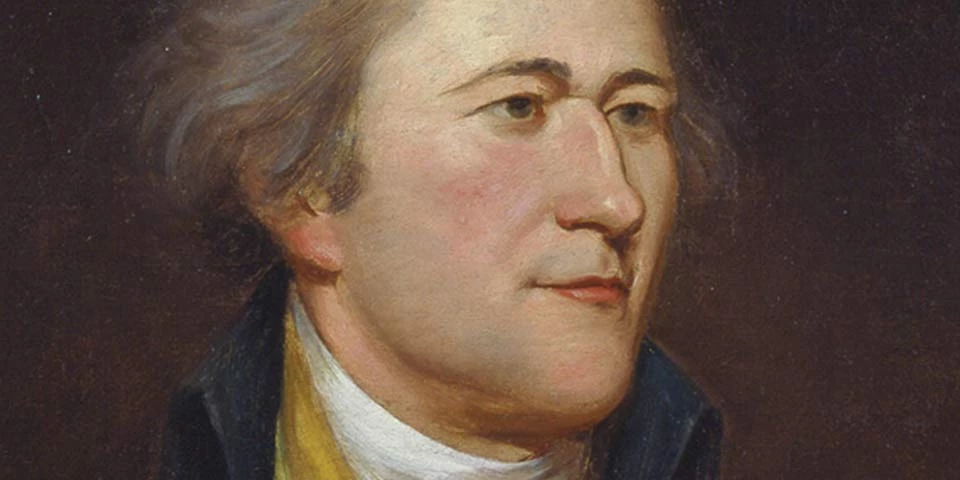Part of a series of articles titled The Constitutional Convention: A Day by Day Account for June 1787.
Article
June 18, 1787: Hamilton Speaks

Independence National Historical Park
"Hamilton."
--Dr. William Samuel Johnson (CT), in his diary
Monday, June 18, 1787: The Convention Today
Only twice during the year did Dr. William Samuel Johnson (CT) indicate in his diary what had occurred in the Convention. Today he followed the routine notation "In Convention" with one word: "Hamilton."
On a motion from John Dickinson (DE), the Committee of the Whole agreed that the Articles of Confederation should be so amended "as to render the Government of the United States adequate to the exigencies, the preservation and the prosperity of the union."
Alexander Hamilton (NY) then rose, and began a speech which lasted the rest of the day. He didn't like either plan, "... being fully convinced, that no amendment to the confederation, leaving the states in possession of their sovereignty could possibly answer the purpose." He proceeded, at length, to compare the Virginia and New Jersey plans against what he viewed as the essentials of a sound government and then proposed a plan of his own - a bicameral legislature with power to pass all laws; a House elected by the people for three years; a senate elected by electors from electoral districts to serve for life; a Governor to be chosen by the people voting in electoral districts to serve during good behavior; and state governors to be appointed by the Federal Government.
In his notes, James Madison wrote, "Mr. Hamilton had been hitherto silent on the business of the Convention... partly from his delicate situation with respect to his own state, to whose sentiments as expressed by his colleagues, he could by no means accede. [NY delegates Yates and Lansing opposed a national system.] The crisis …was too serious to permit any scruples whatever to prevail over the duty imposed on every man to contribute his efforts…. He was obliged to declare himself unfriendly to both plans. He was particularly opposed to that of N. Jersey, being fully convinced that no amendment of the confederation, leaving the States in possession of their sovereignty could possibly answer the purpose."
Hamilton's plan forever tarred him in the view of some as a monarchist, but it had the effect of moving the Virginia Plan to the center of the spectrum.
Synopsis
Delegates Today
Only twice during the year did Dr. William Samuel Johnson (CT) indicate in his diary what had occurred in the Convention. Today he followed the routine notation "In Convention" with one word: "Hamilton."
On a motion from John Dickinson (DE), the Committee of the Whole agreed that the Articles of Confederation should be so amended "as to render the Government of the United States adequate to the exigencies, the preservation and the prosperity of the union."
Alexander Hamilton (NY) then rose, and began a speech which lasted the rest of the day. He didn't like either plan, "... being fully convinced, that no amendment to the confederation, leaving the states in possession of their sovereignty could possibly answer the purpose." He proceeded, at length, to compare the Virginia and New Jersey plans against what he viewed as the essentials of a sound government and then proposed a plan of his own - a bicameral legislature with power to pass all laws; a House elected by the people for three years; a senate elected by electors from electoral districts to serve for life; a Governor to be chosen by the people voting in electoral districts to serve during good behavior; and state governors to be appointed by the Federal Government.
In his notes, James Madison wrote, "Mr. Hamilton had been hitherto silent on the business of the Convention... partly from his delicate situation with respect to his own state, to whose sentiments as expressed by his colleagues, he could by no means accede. [NY delegates Yates and Lansing opposed a national system.] The crisis …was too serious to permit any scruples whatever to prevail over the duty imposed on every man to contribute his efforts…. He was obliged to declare himself unfriendly to both plans. He was particularly opposed to that of N. Jersey, being fully convinced that no amendment of the confederation, leaving the States in possession of their sovereignty could possibly answer the purpose."
Hamilton's plan forever tarred him in the view of some as a monarchist, but it had the effect of moving the Virginia Plan to the center of the spectrum.
Synopsis
- Alexander Hamilton spoke at length, comparing the Virginia and New Jersey Plans, and introducing his own plan
Delegates Today
- General Washington (VA) dined at the quarterly meeting of the Friendly sons of St. Patrick at City Tavern and drank tea at Dr. Shippen's with the doctor's daughter, Ann (Nancy) Shippen Livingston.
- The day was warm, with an afternoon shower.
- Dr. William S. Shippen described today's tea party in a letter: “Genl. Washington, Col. and Mrs. Hamilton, Mrs. Bingham, Mrs. Powell, Miss Coxe, Mr. Corbin, Mr. Jackson and Mr. Chaumont made your sister's tea party..."
Last updated: February 25, 2022
